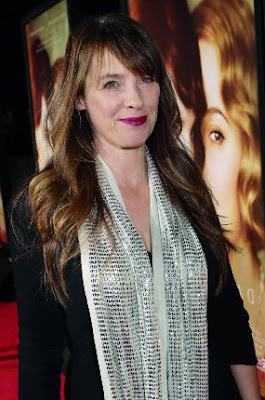This emotionally absorbing version of the life of
Elizabeth I (BBC/PBS Boston, 2005) begs attention to its lead, distinguished British actress
Anne-Marie Duff. Among her many credits, Duff starred in
Shameless (series streaming on Netflix); had a supporting role as a whiney social-climber in the BBC2/HBO mini-series,
Parade's End; and she just ended a run at NYC's Lincoln Center as a glamorous Lady MacBeth opposite
Ethan Hawke's MacBeth.
In
Elizabeth I: the Virgin Queen, Duff (shown at left) dazzles and convinces compared to other Elizabeth's -- more so than
Glenda Jackson,
Cate Blanchett, or
Helen Mirren, for instance. Although credit or debit goes to the actor, the writing is all important, Duff has said; her Queen is a brilliant living creation rather than a scripted historical figure. Some find Duff histrionic but her view of her job is to embrace the truth of each person she plays -- likeable or not. Here, she dazzles while being difficult and appearing plain.
This re-imagining of Elizabeth's gleaming tenure hangs on a love story -- that of her intense relationship with childhood friend and advisor,
Robert Dudley -- rather than on an orderly chronology of events. Major events reveal her personality -- the shrewd, coy, jealous, manipulative, vain, and absolutely devoted head of state. One running theme is her advisors' dogged efforts to get her to marry. Elizabeth used those years to improve her domination over the male power structure by pitting suitors and courtiers against each other for her favor, gradually creating a cult of personality as "Virgin Queen" married to her people. This circumvented her privy council's marriage imperative while also providing a steady diet of the adoration she must have craved as Henry VIII's out-of-favor child. Above all she sabotaged any effort to interfere with her supremacy ("I will have no man rule over me").

One reviewer called the production "a hodge-podge treatise on sexual frustration", but Elizabeth had plenty of motive to avoid marriage, her father having decapitated her mother, Anne Boleyn, and set upon her many step-mothers. Her defensive armor against marriage "comes at the price of a cold bed', warned Dudley, who wanted to marry her and whom she dangled for years even though she loved him. Played by a seductive
Tom Hardy (at right and further above), Dudley stayed at her side during his two marriages until his death, leaving Elizabeth bereft and miserable. (His role as Dudley was a star turn for Hardy, who lately fills his dance card in Hollywood blockbuster and B-list movie parts.)
But as attractive as Tom Hardy's Dudley, the production sells short the real Robert Dudley, writing him as a boy-toy whom Elizabeth promoted and enriched in order to keep close rather than as the statesman he was. The Dudley of history came from ruined nobility but used Elizabeth's patronage to foster the Renaissance. He was a patron of all the arts, scholarship, exploration, a modern business entrepreneur, and a master at foreign policy and war -- in short a fit advisor and companion for his brilliant Queen. The real Dudley's role in the Renaissance is worth knowing and there's no inkling of it here.
Whatever the flaws in this barreling narrative, all are outweighed by the sheer force of Duff's Elizabeth and the poignancy of her frustrated relationships. One admires how the girl outwits and bends the forces against her, how the woman triumphs, suffers loss, and endures the indignities of aging. At her death, we ourselves are bereaved. Her last advisor
Robert Cecil tells us: "Then the flame was extinguished and she began to slip away from us. Too weak to walk, she has spent the last 15 hours standing in her chamber, refusing to sit, lest she never rise again..." (middle fingers drawn across her mouth like a child seeking comfort.) "Then after 40 years as sovereign, she quietly departed this life."
Paula Milne, writer (shown at right), and
Coky Giedroyc, director, (shown below) score a triumph making Elizabeth's life and eccentricities imaginable and their plucking the extraordinary Anne-Marie Duff out of the firmament of fine actresses to get the job done. The pulsing, haunting score deserves special mention, a combination of medieval and Celtic songs and chants sung by The Mediaeval Baebes and The London Bulgarian Choir, among others.
Now that Elizabeth's story has been told over and over, it could be time to explore this period through the man who sat close to power and used his own to nurture the institutions that produced a Golden Age. That would be Sir Robert Dudley, Earl of Leicester, himself, a very original Renaissance man.
Elizabeth I: Virgin Queen, running just under four hours, is available now on DVD and streaming from
Netflix or via
Amazon and Amazon Instant Video.
This post was written by TrustMovies' guest columnist,
Lee Liberman, who will be joining us
now and again to cover various films.



















































